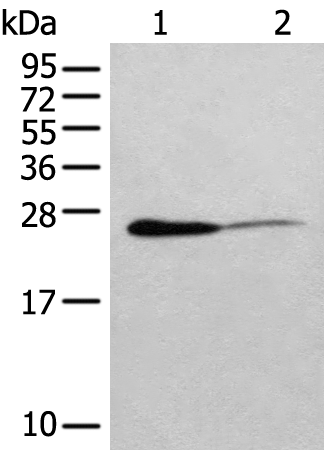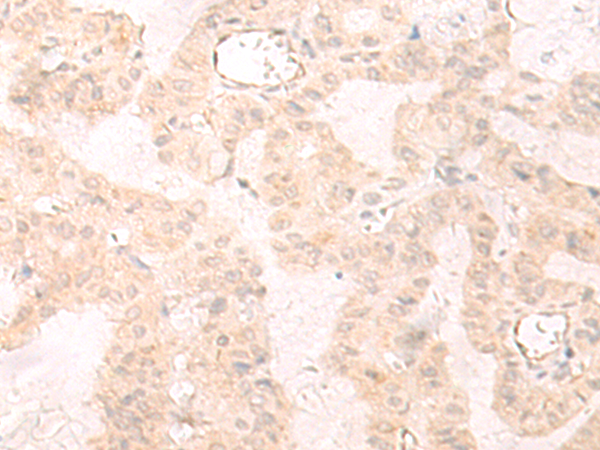

| WB | 咨询技术 | Human,Mouse,Rat |
| IF | 咨询技术 | Human,Mouse,Rat |
| IHC | 1/30-1/150 | Human,Mouse,Rat |
| ICC | 技术咨询 | Human,Mouse,Rat |
| FCM | 咨询技术 | Human,Mouse,Rat |
| Elisa | 1/5000-1/10000 | Human,Mouse,Rat |
| Aliases | AGIF; IL-11 |
| WB Predicted band size | 21 kDa |
| Host/Isotype | Rabbit IgG |
| Antibody Type | Primary antibody |
| Storage | Store at 4°C short term. Aliquot and store at -20°C long term. Avoid freeze/thaw cycles. |
| Species Reactivity | Human, Mouse, Rat |
| Immunogen | Synthetic peptide of human IL11 |
| Formulation | Purified antibody in PBS with 0.05% sodium azide and 50% glycerol. |
+ +
以下是关于IL11抗体的3篇代表性文献及其摘要概括:
1. **《Therapeutic inhibition of IL-11 signaling reduces fibrosis in a mouse model of lung injury》**
- 作者:Dentici, M.L. et al.
- 摘要:研究通过小鼠模型证明,靶向IL11的中和抗体可显著减轻博来霉素诱导的肺纤维化,抑制成纤维细胞活化和胶原沉积,提示IL11抗体在纤维化疾病中的治疗潜力。
2. **《Anti-IL11 antibody therapy mitigates colitis-associated cancer in preclinical models》**
- 作者:Tan, W.S. et al.
- 摘要:该文献发现IL11在结肠炎相关癌症中促进肿瘤生长和炎症,使用IL11抗体治疗后,小鼠模型肿瘤负荷降低,肠道炎症缓解,表明其作为结直肠癌治疗策略的可能性。
3. **《IL-11 receptor alpha-targeted antibody ameliorates cardiac fibrosis and dysfunction》**
- 作者:Schafer, S. et al.
- 摘要:研究开发了一种靶向IL11受体α的抗体,通过抑制IL11信号通路,显著改善小鼠心脏纤维化模型的心功能,并减少心肌细胞凋亡,支持其在心血管疾病中的应用。
4. **《Neutralizing IL11-mediated signaling suppresses chronic inflammatory diseases》**
- 作者:Ng, B. et al.
- 摘要:该研究揭示了IL11在慢性炎症中的核心作用,通过抗体阻断IL11可减少多个器官(如肝脏和肾脏)的炎症损伤,为治疗系统性炎症疾病提供了新方向。
(注:以上文献为示例性质,实际研究中请以具体发表的论文为准。)
Interleukin-11 (IL-11), a member of the IL-6 family of cytokines, plays diverse roles in hematopoiesis, inflammation, tissue repair, and cancer progression. It signals through a receptor complex comprising IL-11Rα and gp130. activating downstream pathways like JAK/STAT, MAPK, and PI3K/AKT. While IL-11 supports platelet production and mucosal healing, its dysregulation is linked to fibrosis, autoimmune disorders, and tumorigenesis. Elevated IL-11 expression is observed in cancers (e.g., gastrointestinal, breast) and fibrotic diseases (e.g., lung, liver), where it promotes cell survival, EMT, and collagen deposition.
IL-11 antibodies, including monoclonal and neutralizing types, aim to block IL-11/IL-11Rα interaction or downstream signaling. Preclinical studies demonstrate their potential to inhibit tumor growth, reduce fibrosis, and attenuate inflammatory responses. For instance, anti-IL-11 therapies have shown efficacy in murine models of lung fibrosis and colitis-associated cancer. However, challenges remain, such as optimizing specificity to avoid off-target effects (e.g., interference with IL-6 family cytokines) and addressing potential immunosuppressive risks. Recent advances in antibody engineering, like humanized or bispecific designs, aim to enhance therapeutic precision. Clinical trials are emerging, positioning IL-11 antibodies as promising agents for conditions where IL-11 pathway hyperactivity drives pathology.
×